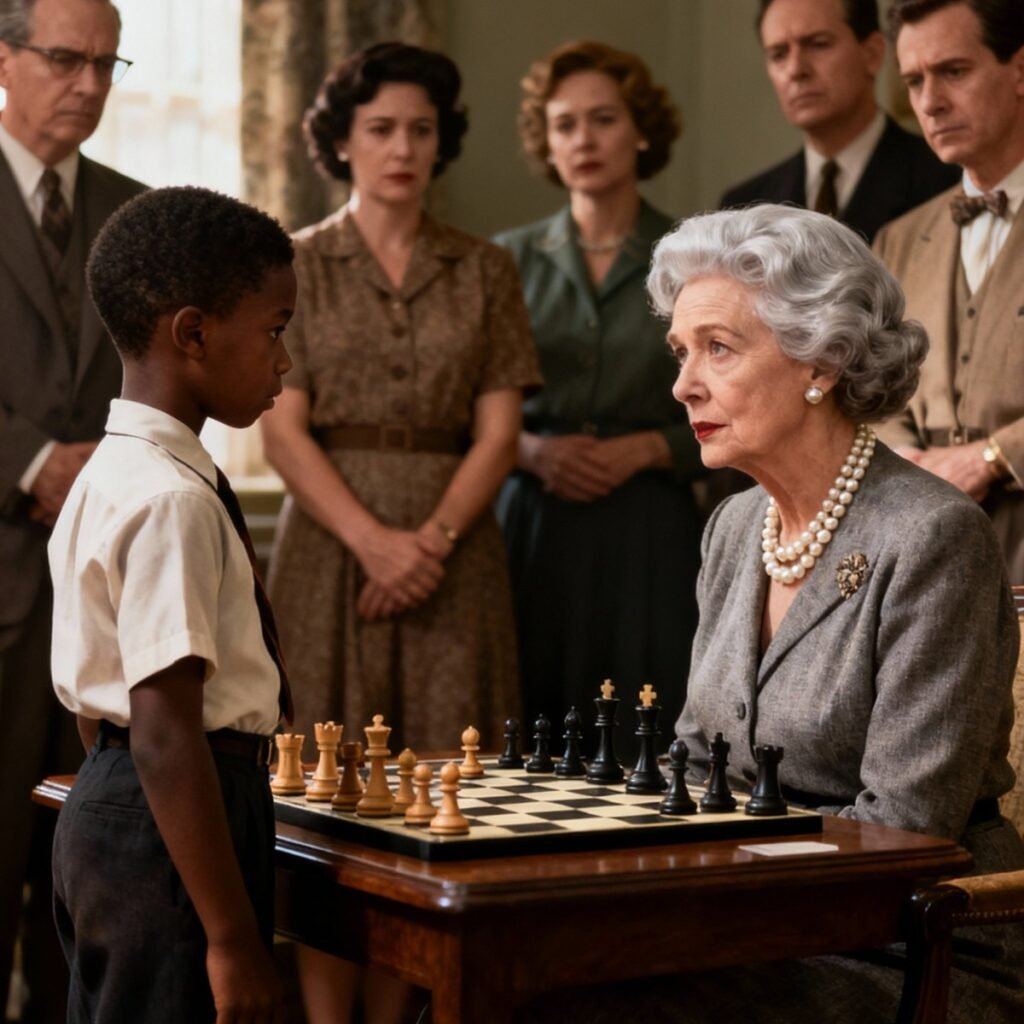The Son of the Maid and the Millionaire
As a prank, the wealthy asked her maid’s Black son to play chess.
She was unaware that he had been a brilliant chess player as a child.
With the haughtiness of someone who had never earned anything in her life, Mrs. Victoria Wittmann spoke with a voice that reverberated through the marble hall of her mansion in Beverly Hills, saying, “Come here, boy.”
Why don’t you demonstrate for me how you play chess in the slums?

When the millionaire decided to make seventeen-year-old Diego Santos the star of the evening, he was assisting his mother, Carmen, in serving guests at a charity dinner. Behind their crystal glasses, the visitors, who included politicians, businesspeople, and their well-groomed wives, chuckled quietly.
is obvious that Victoria had not anticipated one of the hors d’oeuvres being served in her home, even if she had planned the event to raise money for impoverished youngsters. She was delighted by the irony.
Victoria pointed to the elaborate Italian chessboard on the coffee table and remarked, “I bet he can at least move the pieces.”
Mr.
Hamilton, the owner of three hotel chains, muttered, “It will be entertaining to see what this boy can accomplish against someone who has truly studied the game.”
“He probably isn’t even aware that the knight makes an L-shaped movement.”
Laughter spread like waves of dominance around the room.
Carmen gripped the silver tray tighter and lowered her gaze. She had to see her boss treat her son like a joke after twenty years of cleaning that house and raising him by herself.
Having known Carmen since childhood, Victoria had seen her change from a pampered heiress to a chilly socialite.
Victoria pretended to be kind when she remarked, “Carmen, you can stop serving for a few minutes.” “Watch your son play; it will teach you both things.”
Diego, however, did not move.
His black eyes looked at every face in the room as well as the board.
He had already discovered at the age of seventeen that silence speaks louder than words about people.
And he observed a room full of individuals who didn’t know who they were dealing with in that quiet.
His posture had a certain calmness to it, akin to the quiet before a storm. His fingers moved as he imagined movements on an unseen board.
At last, he responded calmly, “Of course, Mrs. Wittmann.”
“I will be delighted to do so.”
Victoria settled into a leather armchair like a queen waiting for a performance, grinning smugly.
“Great. You haven’t played on a board like this before, have you? Each piece of authentic Italian marble is worth more than you might expect.
Jennifer Mills, a congresswoman, scowled as she sat by the window.
“Are you certain that this isn’t harsh, Victoria? The poor boy may suffer embarrassment.
Victoria responded, readjusting her diamond earrings, “Nonsense.” It’s an opportunity to learn. The fact that he played chess in a genuine mansion will allow him to boast.
Victoria Wittmann was about to discover the hard way that this “slum boy” had been studying every chess opening, grandmaster strategy, and trap ever documented for the previous eight years.
Diego consumed used chess books and watched renowned games on a malfunctioning computer that he had mended himself while his classmates played video games.
He studied the Kasparov, Fischer, and Carlsen games in the early hours of the morning as his mother worked double shifts.
He could recite fifty defenses by heart and had over two hundred openings committed to memory.
Most importantly, though, he was going to make the woman who had undervalued him seem bad in front of all of her influential friends.
Victoria made a stunning entrance to the game.
“It’s a family tradition, dear, that I always play white.”
Diego just nodded and positioned the black pieces precisely, centering each one.
Victoria said, “Let’s make this interesting.” “I’ll give a thousand dollars to a public school if the boy can even frighten me.”
Once more, there was laughter, but Diego only grinned, a slender, sardonic grin that stopped short of his eyes.
His mom trembled. He always had that smile on his face when someone undervalued him, and she knew it.
Victoria pawned the E4 to start. “King’s Pawn.” “I learned a classic opening at Harvard,” she added patronizingly.
Diego immediately responded: C5. The Defense of Sicily.
There was silence in the room.
That was hardly a beginner’s move.
Intrigued, Congresswoman Mills leaned forward.
It became evident as the game went on that Diego was ahead and not responding. Each movement was deliberate and accurate.
“Victoria, this boy is running a Dragon Variation,” Mr. Hamilton muttered. He understands exactly what he’s doing; therefore, this isn’t luck.
Victoria snarled, “Nonsense,” but her self-assurance wavered.
Diego cornered her in a matter of minutes. Only a skilled player could spot the subtle trap he prepared with his tenth move.
“Victoria, this kid is no amateur,” Hamilton said in a shaky voice.
She didn’t listen, though.
She was too preoccupied with maintaining her delusion of superiority.
Diego then took an unexpected action. He got up and went to his mom.
He said, “Mom,” quietly but loudly enough for everyone to hear. “Recall that you promised to reveal our true selves to them one day?”
Carmen nodded, eyes gleaming.
The night he said he would change everything was all she could recall.
He went back to the board. Now there was silence in the room.
He generated a double threat with his next move: if he protects one piece, he loses another; if he protects both, he faces checkmate.
Victoria’s face lit up with surprise as she gazed at the board.
“That isn’t feasible,” she said.
Hamilton got up. “Victoria, a child who has most likely never even visited a chess club, is outplaying you.”
Diego answered simply, “Check.”
Victoria’s hands were shaking when she looked up.
She said, “You must have committed that to memory.”
“You’re correct,” Diego stated coolly. “From Kasparov, Garry.”
“You learned from Kasparov?”
“Not directly. All 1,830 of his games were examined by me.
The room fell silent.
Victoria experienced the pain of genuine humiliation for the first time in her life.
Carmen took a step forward and spoke steadily.
We couldn’t afford internet, so my son walked six miles to the library. He studied by candlelight after we turned out the lights. He deserved everything you just witnessed.
The last move then occurred.
“Checkmate,” Diego murmured.
The visitors let out a gasp. Pale and disheartened, Victoria gazed at the board.
For the first time, the others in that room viewed her with shame rather than admiration.
With composure, Diego reset the pieces and replied, “Thank you for the game, Mrs. Wittmann.” “It was… instructive.”
Carmen glanced at her boss before she left.
“I appreciate you proving to me that my son should be in a better place than this.”
Congresswoman Mills yelled after them as they left, “Diego! Would a scholarship pique your interest? Universities I know would be thrilled to have your talent.
It was the first time Diego had a true smile. “I’m really intrigued, ma’am.”
Diego Santos entered Stanford University’s halls on a full scholarship six months later.
In just two weeks, the account of that night had received three million views.
The headlines said, “Slum prodigy humiliates millionaire in chess.”
Victoria Wittmann became a social pariah.
Even her closest friends shunned her, charities removed her name, and her clubs canceled her memberships.
Diego, meanwhile, started a free online chess program for children from low-income families. In just six months, 1,200 kids were learning life strategy in addition to chess.
“Chess taught me that everyone has value on the board of life,” Diego remarked in an interview. “And I learned from Mrs. Wittmann that some people must lose everything before they realize what’s critical.”
He grinned when asked if he harbored resentment.
“Grudges are worthless objects. I would rather concentrate on creating something worthwhile.
Victoria realized she had lost more than just a game as she watched the interview by herself in her deserted mansion. She had also lost her humanity.
True nobility is not inherited, as Diego demonstrated. It is earned.
By perseverance, not by privilege.
And his mother realized that the best retaliation isn’t to destroy people who look down on you as she proudly displayed his Stanford diploma next to the framed picture of his first tournament victory.
The goal is to soar so far above them that they can never get to you.


